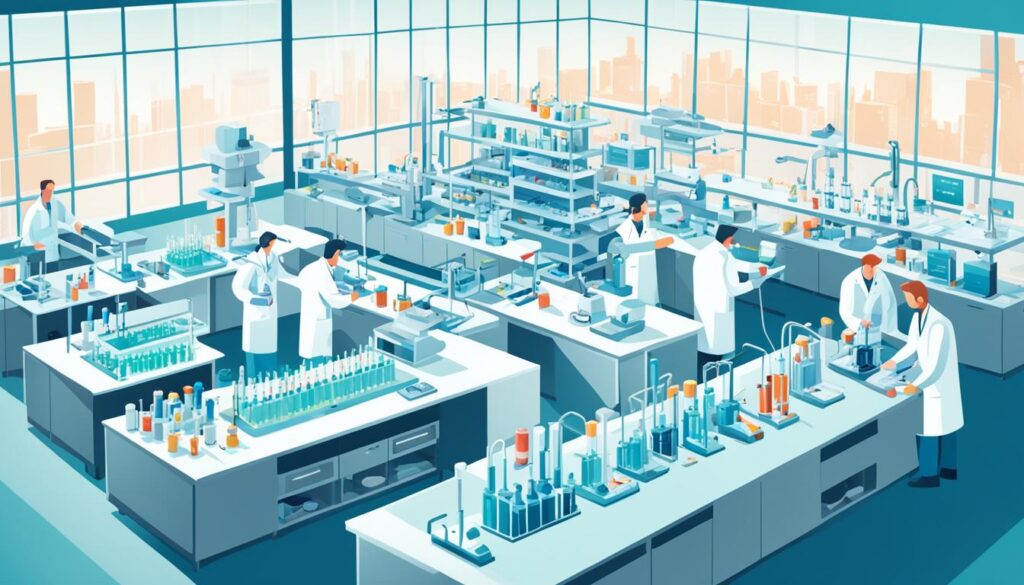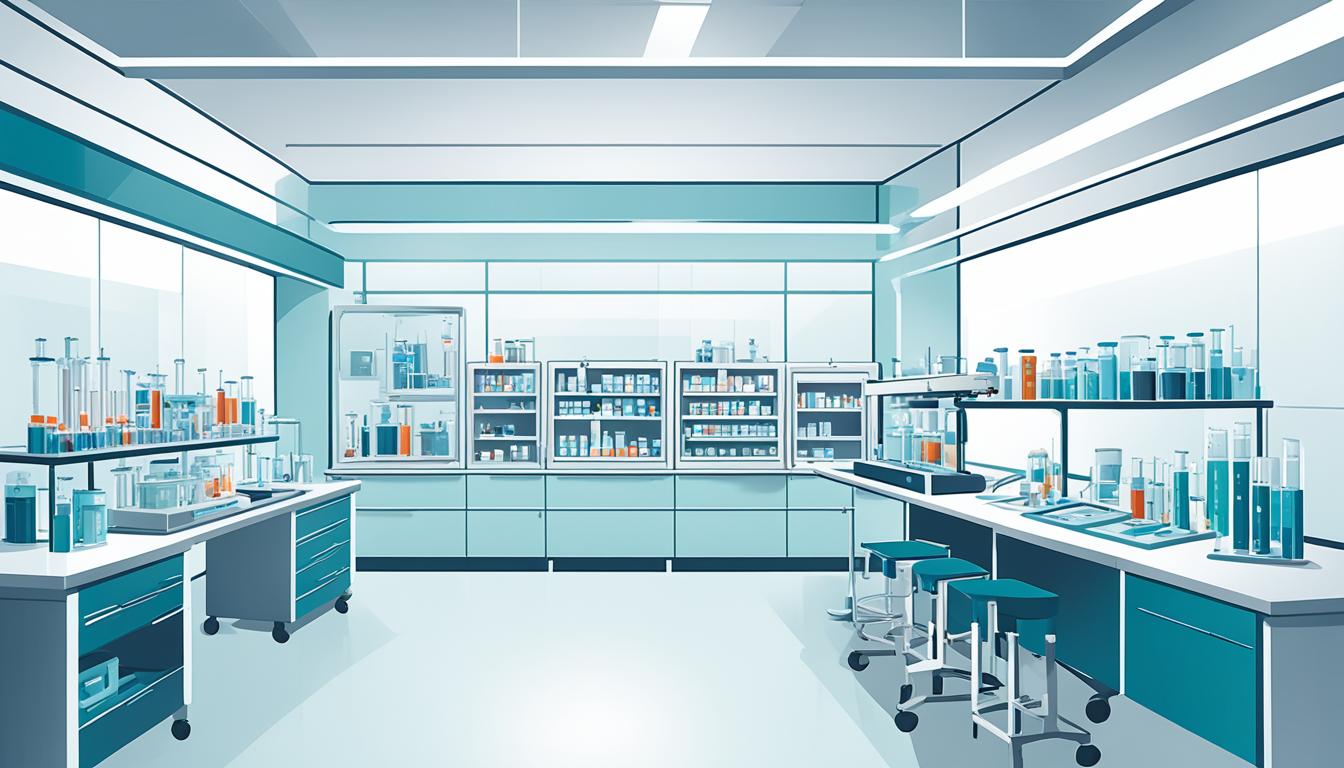Did you know that the global clinical laboratory services market is expected to reach $426.97 billion by 2027? This represents a significant opportunity for entrepreneurs looking to enter the medical testing industry. Starting a laboratory testing business requires extensive research and planning, but with the right approach, it can be a rewarding and lucrative venture.
As a laboratory startup founder, it’s crucial to develop a comprehensive clinical lab business plan that outlines your diagnostic testing services, target market, and financial projections. You’ll also need to hire professional staff members who can follow proper procedures to ensure your lab maintains or earns necessary accreditations.
Medical laboratories play a vital role in healthcare by conducting tests and analyses that help doctors diagnose and treat patients’ problems, as well as monitor their conditions throughout the course of treatment. By starting a laboratory testing business, you can contribute to improving patient outcomes while building a successful entrepreneurial venture in the medical testing industry.
Key Takeaways
- The global clinical laboratory services market is projected to reach $426.97 billion by 2027, presenting a significant opportunity for entrepreneurs.
- Developing a comprehensive clinical lab business plan is essential for outlining your diagnostic testing services, target market, and financial projections.
- Hiring professional staff who can follow proper procedures is crucial for maintaining or earning necessary accreditations.
- Medical laboratories play a vital role in healthcare by helping doctors diagnose and treat patients’ problems and monitor their conditions over time.
- Starting a laboratory testing business allows you to contribute to improving patient outcomes while building a successful entrepreneurial venture.
Understand the Importance of Medical Laboratories in Healthcare
Medical laboratories play a crucial role in the healthcare industry by providing essential diagnostic services and treatment monitoring. These labs work closely with healthcare providers to help diagnose patient problems accurately and efficiently. By conducting various tests and analyses, medical laboratories enable doctors to make informed decisions about patient care.
One of the primary functions of medical laboratories is to assist in diagnosing patient problems. When a patient presents with symptoms, healthcare providers often rely on laboratory tests to identify the underlying cause. These tests can range from simple blood work to complex genetic analyses. Medical laboratories use state-of-the-art equipment and techniques to provide accurate and timely results, which help doctors determine the appropriate course of treatment.
In addition to diagnosis, medical laboratories also play a vital role in treatment monitoring. Once a patient has been diagnosed and a treatment plan has been established, regular laboratory tests can help healthcare providers track the patient’s progress and adjust the treatment as needed. By monitoring key biomarkers and other indicators, medical laboratories can help ensure that patients receive the most effective care possible.
Some of the key services provided by medical laboratories include:
- Blood tests
- Urine analysis
- Tissue biopsies
- Genetic testing
- Microbiology and infectious disease testing
- Toxicology screening
By offering these and other essential services, medical laboratories support healthcare providers in delivering high-quality patient care. As technology continues to advance, the role of medical laboratories in healthcare is likely to become even more important, with new tests and techniques emerging to improve diagnosis and treatment outcomes.
Conduct Thorough Research and Create a Comprehensive Business Plan
Before diving into starting your laboratory testing business, it’s crucial to conduct extensive research and create a comprehensive business plan. A well-crafted business plan serves as a roadmap for your venture, outlining your goals and the strategies you’ll employ to achieve them. By investing time and effort into this process, you’ll be better prepared to navigate the challenges and opportunities that lie ahead.
Executive Summary
Your business plan should begin with an executive summary that highlights the key elements of your laboratory testing business. This section should provide a concise overview of your mission, the services you intend to offer, your target market, and what sets your business apart from competitors. The executive summary is often the first thing potential investors or partners will read, so make sure it effectively captures their attention and conveys your vision.
Products and Services
In this section, clearly define the products and services your laboratory will offer. Provide detailed descriptions of each test or analysis you plan to conduct, along with any additional services you may provide. Be sure to include information about your pricing structure and any unique features or benefits your services offer compared to those of your competitors.
Market Analysis
A thorough market analysis is essential for understanding your target market, identifying potential customers, and assessing the competitive landscape. Research your target market’s demographics, needs, and preferences to ensure your services align with their requirements. Analyze your competition to identify their strengths and weaknesses, and determine how you can differentiate your laboratory testing business to gain a competitive edge.
Marketing Strategy
Develop a comprehensive marketing strategy that outlines how you plan to attract and retain customers. Consider various marketing channels, such as:
- Online advertising
- Social media marketing
- Networking events
- Direct mail campaigns
- Referral programs
Your marketing strategy should focus on highlighting the unique value proposition of your laboratory testing services and effectively communicating the benefits to your target market.
Budget and Financial Planning
Creating a detailed budget and financial plan is crucial for the success of your laboratory testing business. This section should include a pro forma statement that projects your future income and expenses. Consider factors such as:
- Startup costs (e.g., equipment, facilities, licenses)
- Operating expenses (e.g., salaries, supplies, utilities)
- Revenue projections based on your pricing and expected sales volume
- Cash flow projections
- Break-even analysis
By carefully planning your finances, you’ll be better prepared to secure funding, manage your resources effectively, and ensure the long-term viability of your laboratory testing business.
Choose the Appropriate Business Structure for Your Lab
When starting a laboratory testing business, one of the crucial decisions you’ll need to make is selecting the right business structure. The laboratory business structure you choose will determine your lab’s legal responsibilities, tax obligations, and overall operational framework. It’s essential to carefully consider your options and seek legal and tax advice to determine the best fit for your lab’s specific goals and needs.
There are several common business structures to choose from when establishing your laboratory:
Sole Proprietorship
A sole proprietorship is the simplest business structure, with a single owner who has full control over the lab’s operations. As the sole proprietor, you’ll be personally responsible for all debts and liabilities incurred by the business.
Partnership
If you plan to start your laboratory with one or more partners, a partnership structure may be suitable. In a partnership, two or more owners share the responsibilities, profits, and losses of the business.
Corporation (C or S)
A corporation is a more complex business structure that creates a separate legal entity from its owners. Corporations offer personal liability protection but come with additional formalities and tax considerations. You can choose between a C corporation or an S corporation, each with its own tax treatment.
Limited Liability Company (LLC)
An LLC combines elements of both partnerships and corporations. It provides personal liability protection for its owners (called members) while allowing flexibility in management and tax treatment.
When deciding on the appropriate business structure for your laboratory, consider factors such as personal liability, tax implications, management structure, and future growth plans. Consulting with legal and tax professionals can help you make an informed decision that aligns with your lab’s unique circumstances.
Secure Funding for Your Laboratory Business
When starting a laboratory business, one of the most crucial aspects is securing adequate financing. There are several financing options for lab startups, each with its own advantages and considerations. By carefully evaluating your funding needs and exploring the available options, you can set your laboratory on a path to financial stability and success.
One common approach to financing a lab startup is self-funding. This involves using your personal savings, investments, or tapping into the financial resources of close acquaintances. Self-funding gives you complete control over your business and allows you to maintain full ownership. However, it’s essential to assess your financial capacity and the potential risks involved before committing your own funds.
Another financing option is seeking investor capital. By sharing your comprehensive business plan with potential investors, you can attract their interest and negotiate terms for their financial backing. Investors can provide significant capital injections and valuable expertise, but it’s important to carefully consider the level of control and ownership you’re willing to relinquish in exchange for their support.
Bank loans are also a viable financing option for laboratory businesses. To secure a bank loan, you’ll need to present a well-crafted business plan and detailed financial projections spanning at least five years. Banks will assess your creditworthiness, collateral, and the overall viability of your lab venture before approving a loan. It’s crucial to have a solid understanding of the loan terms, interest rates, and repayment obligations before proceeding.
Regardless of the financing route you choose, it’s highly recommended to seek expert financial advice. Consult with accountants, financial advisors, or experienced entrepreneurs in the laboratory industry to gain valuable insights and guidance. They can help you navigate the complexities of financing, assess the feasibility of your funding strategies, and ensure that you make informed decisions for the long-term financial health of your laboratory business.
Remember, securing the right financing is a critical step in establishing a thriving laboratory startup. By carefully evaluating your options, creating a compelling business plan, and seeking expert advice, you can position your lab for success and embark on an exciting entrepreneurial journey in the healthcare industry.
Find the Perfect Location for Your Lab Facility
Choosing the right laboratory facility is a critical decision that can impact your lab’s success. When evaluating potential lab locations, there are several key factors to consider to ensure your space meets your current needs and supports future growth.
Site Location Considerations
The physical location of your lab space can significantly affect your operations. Consider the following when selecting a site for your laboratory facility:
- Proximity to sample origins and destinations for efficient logistics
- Accessibility for staff, vendors, and other visitors
- Surrounding environment and potential hazards or contaminants
- Local zoning regulations and permit requirements for lab facilities
Facility Size and Future Growth
When determining the appropriate size for your lab facility, it’s important to strike a balance between your current space needs and potential future expansion. Keep these points in mind:
- Allocate sufficient space for all necessary equipment, workstations, and storage
- Plan for additional capacity to accommodate new instruments, technologies, or increased demand
- Consider modular or flexible lab designs that can adapt to changing requirements
- Factor in non-lab areas like offices, break rooms, and conference rooms
Electrical and Plumbing Requirements
Laboratories have unique utility needs compared to typical office or commercial spaces. Pay close attention to the electrical and plumbing infrastructure when evaluating potential lab facilities:
- Ensure the facility has adequate electrical capacity and outlets for powering lab equipment
- Check for specialized electrical requirements like emergency power or uninterruptible power supply
- Verify the presence and location of necessary plumbing fixtures such as handwash sinks and emergency showers
- Confirm proper drainage and waste management systems are in place, including floor drains and neutralization tanks
By carefully considering site location, facility size, and utility requirements, you can find the perfect space to establish and grow your laboratory facility. Investing time in the selection process will pay off in the long run with a lab that supports efficient operations and future success.
Invest in Essential Lab and Office Equipment
When starting your laboratory testing business, it’s crucial to invest in the right lab and office equipment to ensure smooth operations and accurate results. Strategic purchasing decisions can help you get the best value for your money while meeting your lab’s specific needs.
Begin by identifying the essential equipment your lab requires based on the types of tests you’ll be conducting. Research various laboratory equipment suppliers to compare features, prices, and customer reviews. Consider buying directly from manufacturers to secure warranties and service contracts that can save you money in the long run.
Alternatively, you may find competitive discounts from third-party equipment vendors. Arrange for demonstrations of key equipment to ensure it meets your expectations before making a purchase. Don’t hesitate to negotiate with vendors for better pricing, extended warranties, or enhanced service terms to get the most value for your investment.

In addition to specialized lab equipment, don’t overlook the importance of ergonomic office furniture to keep your staff comfortable and productive. Invest in adjustable chairs, desks, and computer monitors to reduce the risk of repetitive strain injuries and promote a healthy work environment.
Finally, consider the software solutions your lab will need for efficient billing, reporting, and data management. Look for user-friendly, scalable options that can integrate with your existing systems and grow with your business over time.
By carefully selecting the right lab and office equipment from reputable suppliers, you’ll lay a strong foundation for your laboratory testing business to deliver accurate, reliable results to your customers.
Build a Team of Qualified Laboratory Professionals
As you embark on your journey to start a laboratory testing business, one of the most crucial aspects is building a team of qualified professionals. Your lab’s success heavily relies on the expertise and dedication of your staff. To ensure a smooth and compliant operation, it’s essential to follow employment and labor laws, create comprehensive employee benefits and job descriptions, and consider working with a lab consulting agency for staffing needs.
Follow Employment and Labor Laws
Compliance with federal and state employment laws is non-negotiable when building your laboratory team. These laws cover various aspects, including minimum wage, overtime pay, anti-discrimination, and workplace safety. Familiarize yourself with the relevant regulations and ensure that your hiring practices, employee policies, and workplace environment adhere to these laws. Seeking guidance from an experienced employment attorney can help you navigate the legal landscape and avoid potential pitfalls.
Create Employee Benefits and Job Descriptions
Attracting and retaining top talent in the laboratory industry requires a competitive employee benefits package and well-defined job descriptions. When crafting your lab employee benefits, consider including:
- Health insurance
- Dental and vision coverage
- Retirement plans (e.g., 401(k))
- Paid time off (vacation, sick days, and personal days)
- Professional development opportunities
In addition to benefits, create detailed job descriptions for each position within your laboratory. These descriptions should outline the essential duties, responsibilities, qualifications, and experience required for each role. Clear job descriptions help attract the right candidates and set expectations for your team members.
Work with a Lab Consulting Agency for Staffing
Partnering with a reputable lab consulting agency can significantly streamline your staffing process and help you access a pool of highly qualified candidates. These agencies specialize in placing laboratory professionals, from entry-level technicians to experienced directors, and understand the unique staffing needs of the industry.
A lab consulting agency can assist with:
- Identifying and screening potential candidates
- Conducting initial interviews and background checks
- Negotiating salaries and benefits
- Providing temporary or contract staffing solutions
- Offering guidance on industry best practices and trends
By working with a lab consulting agency, you can save time and resources while ensuring that your laboratory is staffed with skilled professionals who align with your business goals and values.
Obtain Necessary Certifications and Implement Standard Operating Procedures
Once you have your laboratory facility set up and your team in place, it’s time to tackle the administrative side of starting your lab business. This includes obtaining the necessary certifications and implementing standard operating procedures to ensure your lab runs smoothly and compliantly from day one.
To legally operate a medical laboratory in the United States, you’ll need to meet specific lab certification requirements. These include obtaining state licenses and CLIA (Clinical Laboratory Improvement Amendments) certificates. The exact requirements vary by state and the types of tests your lab will perform, so research the regulations that apply to your unique situation. Consider working with a laboratory consulting firm to guide you through the certification process and ensure you have all the necessary paperwork in order.
In addition to external certifications, your lab will need to develop and implement its own standard operating procedures (SOPs). These detailed, written instructions document your lab’s processes to ensure consistent quality and compliance. Well-written SOPs also serve as valuable training tools for your staff. Your SOPs should cover all aspects of your laboratory operations, including:
- Sample handling and storage
- Test methods and protocols
- Quality control and assurance measures
- Equipment maintenance and calibration
- Data management and reporting
- Safety and emergency procedures
Developing comprehensive SOPs takes time and expertise. Many new lab owners find it helpful to engage industry experts or a laboratory consulting agency to create their initial SOPs. This ensures your procedures align with best practices and regulatory requirements from the start. As you hire qualified staff, they can then help refine and maintain your SOPs over time.
By prioritizing lab certification requirements and implementing robust standard operating procedures early in your startup process, you’ll lay a solid foundation for a successful and compliant laboratory business. With the right planning and expert guidance, you can streamline these administrative tasks and have your lab up and running in as little as 90 days.
Define Your Target Market and Service Offerings
When starting a laboratory testing business, it’s crucial to clearly define your target market and the specific products and services you will offer. Conducting thorough market research will help you understand the needs and preferences of your potential customers, as well as identify any gaps in the market that your laboratory services can fill. This information will guide your decision-making process and ensure that your offerings align with the demands of your target market.

Consider the following factors when defining your target market and service offerings:
- Identify the industries or sectors that require the types of laboratory services you plan to provide, such as healthcare, pharmaceuticals, environmental testing, or food safety.
- Determine the geographical area you will serve, whether it’s local, regional, or national, and assess the competition within that market.
- Evaluate the specific needs and pain points of your target customers, and develop products and services that address these issues effectively.
- Differentiate your laboratory services from competitors by offering unique or specialized testing methods, faster turnaround times, or exceptional customer support.
In addition to focusing on paying customers, it’s important to consider key stakeholders like investors who expect deliverables and milestones. Securing long-term customer contracts, multi-phase government research grants, or pursuing direct sales opportunities can provide a stable foundation for your laboratory business after initial funding. By diversifying your revenue streams, you can ensure the long-term sustainability and growth of your venture.
As you develop your service offerings, stay informed about industry trends and regulatory requirements that may impact your laboratory business. Adapting to changes in the market and maintaining compliance with relevant standards will help you remain competitive and attract a loyal customer base. For more insights on starting a successful laboratory business, refer to this step-by-step guide from industry experts.
Understand and Comply with Regulatory Requirements
When starting a laboratory testing business, it’s crucial to understand and comply with the various regulatory requirements that govern the industry. These regulations are mandated by government agencies and industry certification guidelines to ensure the safety, quality, and reliability of laboratory operations. Failure to adhere to these standards can result in penalties, fines, and even the closure of your lab.
The specific regulatory compliance requirements for your laboratory will depend on its intended use. For example, if you plan to conduct pharmaceutical testing, you’ll need to follow the FDA’s Current Good Manufacturing Practices (cGMP) guidelines. These regulations cover all aspects of the manufacturing process, from raw materials to finished products, to ensure the safety and efficacy of drugs.
If your lab will be handling dangerous materials, such as infectious agents or toxic chemicals, you’ll need to comply with the CDC’s biosafety levels. These guidelines classify laboratories into four levels based on the risk associated with the materials being handled. Each level has specific requirements for lab design, safety equipment, and operational procedures to minimize the risk of exposure and contamination.
For laboratories engaged in sensitive manufacturing or research, cleanroom standards may apply. These standards, such as ISO 14644, specify the acceptable levels of airborne particles and other contaminants in a controlled environment. Cleanrooms are designed to maintain a high level of air purity and minimize the risk of contamination, which is essential for many applications, including semiconductor manufacturing, pharmaceutical production, and medical device assembly.
To ensure regulatory compliance, it’s essential to design your laboratory with these requirements in mind from the start. This may involve:
- Consulting with industry experts and regulatory agencies to understand the specific requirements for your lab
- Incorporating necessary safety features and equipment into your lab design
- Developing standard operating procedures (SOPs) that adhere to regulatory guidelines
- Training your staff on regulatory compliance and safety protocols
- Conducting regular audits and inspections to ensure ongoing compliance
By prioritizing regulatory compliance from the outset, you can avoid costly mistakes and ensure the long-term success of your laboratory testing business.
Design a Flexible Laboratory Layout for Future Adaptability
When designing your laboratory, it’s crucial to prioritize flexible lab design that can adapt to evolving needs over the building’s 50-year lifespan. By incorporating modular laboratory furniture and standardized components, you can easily rearrange or expand your lab layout without extensive renovations. This adaptability is essential as labs are often retrofitted for new uses and technologies.
Consider the different zones your lab may require, such as wet labs for handling liquid chemicals, dry labs for small amounts of dry chemicals or computer systems, cleanrooms for contamination-sensitive work, and ESD-protected electronics labs. By designing these spaces with flexibility in mind, you can accommodate changes in research focus or equipment needs. Additionally, creating open, collaborative environments with high-quality design aesthetics can help attract and retain top scientific talent.
As robots increasingly take on mundane tasks in labs, allowing scientists to focus on higher-value work and increased capacity demands, it’s important to integrate modular design solutions that can accommodate both robots and humans. Prefabricated modular lab units are becoming more popular for their adaptability and efficiency. Furthermore, sustainable lab design should focus on energy minimization, water conservation, waste reduction, and location efficiency. Looking ahead, the future of lab design will involve responding to flexible work patterns, cell and gene therapy requirements, and the need for satellite laboratories with drone access for rapid sample transport.
FAQ
What are the key components of a laboratory business plan?
What are the different business structures for a laboratory?
How can I finance my laboratory startup?
What should I consider when choosing a location for my laboratory?
How can I build a professional team for my laboratory?
What certifications and procedures do I need to start a laboratory?
What regulations do laboratories need to comply with?
How can I design a flexible laboratory layout?
Author
-

Lucas Martinez is an accomplished entrepreneur with a passion for startups. He has launched and scaled multiple businesses, providing pragmatic advice on starting and growing a business.
View all posts



